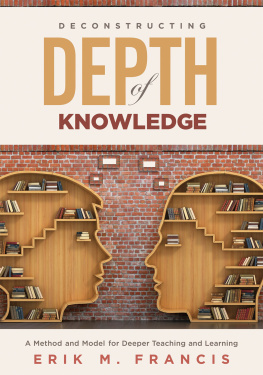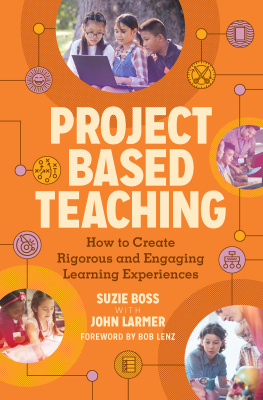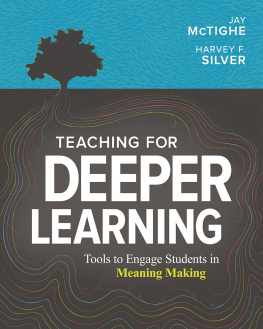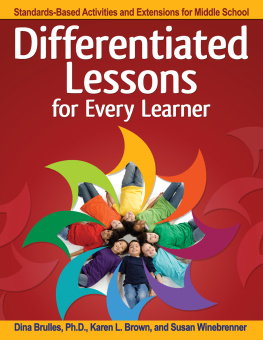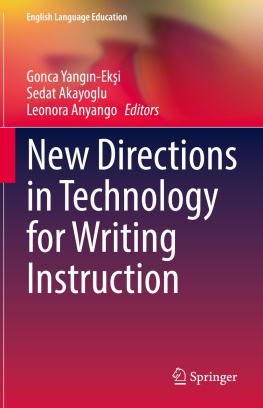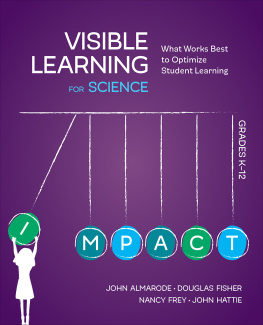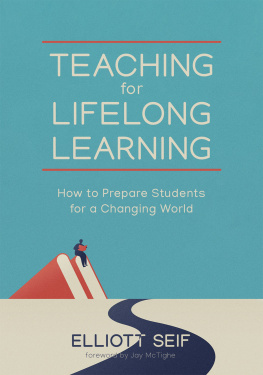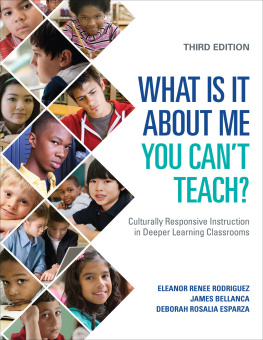Table of Contents
Page List
Guide

DECONSTRUCTING
DEPTH
of
KNOWLEDGE
A Method and Model for Deeper Teaching and Learning
ERIK M. FRANCIS
FOREWORD BY KARIN HESS

Copyright 2022 by Solution Tree Press
Materials appearing here are copyrighted. With one exception, all rights are reserved. Readers may reproduce only those pages marked Reproducible. Otherwise, no part of this book may be reproduced or transmitted in any form or by any means (electronic, photocopying, recording, or otherwise) without prior written permission of the publisher.
Norman Webb developed Webbs Depth-of-Knowledge definitions in 1997 as a tool to analyze alignment between curriculum standards and assessments. At the time he was a Senior Research Scientist for the Wisconsin Center for Education Research and was funded in part by the National Science Foundation (cooperative agreement No. RED-9452971). The DOK definitions describe levels or categories of cognitive complexity. They are not intended to represent progressions in learning or instructional levels. The Wisconsin Center for Education Products and Services (WCEPS) manages WebbAlign, the trademark for Webbs DOK. Updated definitions and supporting materials can be found at www.webbalign.org.
555 North Morton Street
Bloomington, IN 47404
800.733.6786 (toll free) / 812.336.7700
FAX: 812.336.7790
email:
SolutionTree.com
Visit go.SolutionTree.com/instruction to download the free reproducibles in this book.
Printed in the United States of America

Library of Congress Control Number: 2021040147
Solution Tree
Jeffrey C. Jones, CEO
Edmund M. Ackerman, President
Solution Tree Press
President and Publisher: Douglas M. Rife
Associate Publisher: Sarah Payne-Mills
Managing Production Editor: Kendra Slayton
Editorial Director: Todd Brakke
Art Director: Rian Anderson
Copy Chief: Jessi Finn
Production Editor: Alissa Voss
Content Development Specialist: Amy Rubenstein
Copy Editor: Kate St. Ives
Proofreader: Elisabeth Abrams
Text and Cover Designer: Kelsey Hergl
Editorial Assistants: Sarah Ludwig and Elijah Oates
ACKNOWLEDGMENTS
To my wife, Susie Francisthank you for your love, support, and patience, especially as I constantly bounced ideas off you and asked your thoughts on how students in grades K3 might demonstrate or experience Depth of Knowledge even as you spent long days teaching first graders remotely on hybrid and virtual platforms. You helped me keep things in perspective and keep a positive outlook. You kept reminding me to focus on what people will need in the future rather than perseverate on the present. You also made sure I took breaks to take a ride on the Peloton, go in the garage and lift weights, or binge-watch a TV series you discovered. This all helped ease my mind and shape the ideas and strategies in this book.
To my daughters, Madison and Averyyou both are the best daughters a dad could hope to have. The pandemic was neither easy nor fair for either of youMadison, with you finishing, and Avery, with you beginning your high school career during this pandemic. However, you both survived and thrived through this experience, and your resilience both impressed and inspired me. Take what you learned through your education and experience, and use your gifts and talents to do great things. I am proud of both of you and love you very much.
Thanks to my mom, Julia Francis, for always being there to listen whenever I was brainstorming or having writers block. You always made me feel like every idea I came up with was great, and you always reminded me to go to the Shire when I felt frustrated or stressed. Also, thank you to my mother, Wendy Latman, for your encouragement and support in my endeavors professionally and personally.
I also want to thank Amy Rubenstein, my content editor at Solution Tree, for helping me craft this book and make Depth of Knowledge clear and comprehensible. You guided me to recognize what should be said, realize what changes must be made, and remember that You can always save this for another book. Also, thanks to Alissa Voss, my editor from the land down under, for making sure this book was grammatically correct and clear and encouraging me to elaborate further on the ideas and strategies featured in this book. Both of you provided valuable feedback and suggestions that made this book better and stronger.
I also want to express my appreciation to Solution Tree for publishing this book. Claudia Wheatleythank you for introducing me to Solution Tree, for appreciating my ideas and my work, and for believing I have what it takes to be a Solution Tree author. Douglas Rifethank you not only for agreeing to publish this book but also making me feel like I was a valued member of the Solution Tree team even before I signed the contract. Jeff Jonesthank you for always taking the time to talk whenever we crossed paths and asking, So when are you going to write that book for us? Well, here it is, and I am honored to be a Solution Tree author.
Authoring this book also provided me the opportunity to solidify and strengthen relationships with several people professionally and personally. People like Tom Hierck, who kept encouraging me to think critically about how education will change, to think creatively about how to lead and facilitate that change, and to keep my focus/energy on the positive and dont get sucked down the black hole (a quote from a text you sent me on July 20, 2021). Then theres Paula Maeker, who always took time to listen and brainstorm, confirmed or challenged my knowledge and thinking, and reminded me its about how we do and use the work to benefit and serve others. Thank you both for being tremendous advocates and supporters.
I also want to thank the following colleagues and friends who shared their expertise with me and inspired me to think extensively how Depth of Knowledge could complement and support their work: Dr. Katherine McKnight, Dr. Richard Cash, Dr. Jaime Castellano, Dr. Joseph Renzulli, Rick Wormeli, Sara Christopherson from WebbAlign, and, most especially, Dr. Norman L. Webb and Dr. Karin Hess. I appreciate all you have taught me, your collegiality, and your support.
I want to thank the following school leaders who provided me the opportunity to train their teachers on Depth of Knowledge: Rhonda Newton from All Aboard Charter School in Phoenix, Arizona; Carolyn Sawyer from Champion Schools in Phoenix, Arizona; Christopher Hallett, executive director of the Northern Maine Education Collaborative (NMEC); Diana Diaz-Harrison and Lisa Long from Arizona Autism Charter School in Phoenix, Arizona; Kathy Scott from Nogales Unified School District in Nogales, Arizona; Rose Mogus, Rob Housel, and Kristi McDermitt from Summit Academy Canton Elementary in Canton, Ohio; and Koshu Lulla, director of Tele-Temps PTE Limited and Secretariat of Singapore ASCD in Singapore and Malaysia. Working with your educators helped me create and shape the ideas and strategies addressed in this book.
I also want to thank my good friends who were always there to listen and provide their input and support: Gary Horowitz, Dr. Rick Jetter, Rebecca Coda, LaVonna Roth, Dr. Holly Couturier, Lynne Henwood, Greg Wolcott, Tee Lambert, Michael Brien Lane, and Brad Astrowsky.

